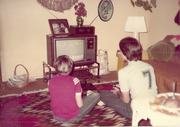View Post [edit]
| Poster: | SJYeo | Date: | Sep 16, 2007 7:31pm |
| Forum: | bookmobile | Subject: | Follow up thoughts/ideas on Bookmobile, IA & Libraries |
One thing we have to remember is that there are differences in libraries in terms of size, resources, services, etc. Because of these differences, their needs, roles, what they can do or not will be very different.
On our trip, one of the most frequently asked questions from librarians was how IA was relevant for them. I think the
answer for this question is the answer for what IA should do to reach out/connect to library community.
What IA has now is free digital collections that are focused on public domain. IA has 250,000+ collection but not all of that content is relevant for each community. One of the main roles of any library is to collect materials that are relevant to their user community and provide services that connect to their collections.
The missing piece is collection, organization, and dissemination tools that they can utilize IA content. For instance, Some libraries can create a cataloging record and add links to IA content. However, this is not going to be a large-scale solution and many libraries outsource their cataloging. IA could create light weight collection / dissemination tools that would allow librarians to create their own subset(s) of IA content and make those subsets visible/searchable to their library. Remember that collection, search and organization go hand in hand.
Many public libraries have interesting local special collections (Eureka PL has the Susie Baker Fountain collection of over 50 years of local news clippings and notes from SBF, a local teacher. 92 volumes + an index done by hand by volunteers!!). IA can help digitize them, make them available for everyone but also support tools for helping them search, find and view their own collections.
IA currently provides services for uploading individual materials but the interface is still not that easy. IA can improve it and make it more user-friendly. Blip-TV and YouTube show how easy it is to upload, describe and disseminate content. This content could also be part of a local library's subset of IA collections.
In order to be successful you need a specific target audience and create best practices. Choose a small range of libraries (in SF or outside; Eureka community seemed most engaged in their library and most aware of IA or Libraries that has not idea about IA) and provide tools and training for using IA collections. Basically you create a model that can be replicated in other libraries and passed on virally. A small amount of outreach/training can go a long way. You could also use this model with academic libraries.
Another part of outreach is using the bookmobile to promote literacy -- a traditional aspect of public library work. With a real internet connection (the satellite dish was nice but not that useful except as a prop) and a set of books ready for printing/binding, the bookmobile could go around to libraries and actually print *lots* of different titles. That'd be great for both outreach AND literacy. The traditional bookmobile concept is strong, especially in rural communities where that's their *only* library access.
We also did guerrilla workshops -- i.e., at Orland library we taught them to blog, helped them troubleshoot their public computers and gave them the vocabulary to talk with their outsourced IT support. With longer stops (1-3 days) the bookmobile could do barcamps/tech training AND help libraries incorporate IA content etc. Prometheus Radio Project does LPFM "barn-raisings" to help communities set up radio stations. IA could do the same thing with the bookmobile.
We think IA is doing a great job making information / knowledge accessible to everyone without cost. But IA needs one more step to connect to the communities that they're looking to serve.
 Live Music Archive
Live Music Archive Librivox Free Audio
Librivox Free Audio Metropolitan Museum
Metropolitan Museum Cleveland Museum of Art
Cleveland Museum of Art Internet Arcade
Internet Arcade Console Living Room
Console Living Room Books to Borrow
Books to Borrow Open Library
Open Library TV News
TV News Understanding 9/11
Understanding 9/11